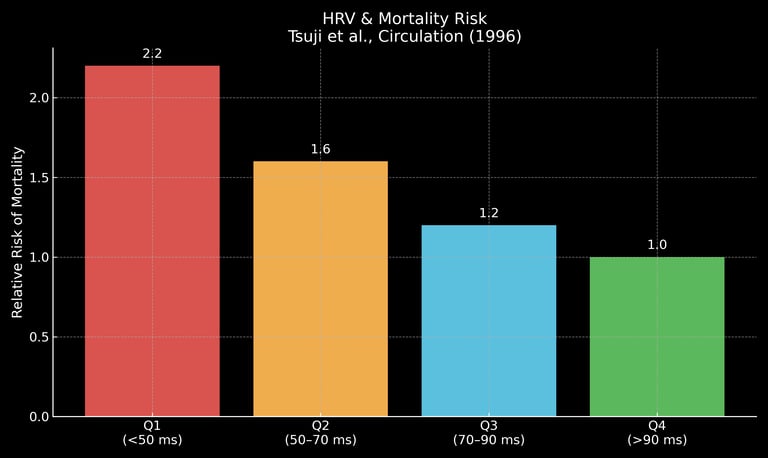Heart Rate Variability (HRV): The Vital Sign You're Not Tracking (Yet)
Heart Rate Variability (HRV) is more than just a fitness stat — it's a window into your nervous system, your recovery capacity, and even your risk of chronic disease. In this article, we break down the science behind HRV, explore why it’s one of the most predictive markers of longevity, and show you how to measure and improve it with real-world habits. Whether you're tracking performance, managing stress, or optimizing your healthspan, understanding HRV is essential.
Dr. Ari Sahebkashaf - The Longevity Lab MD
5/7/20253 min read


You track your steps.
You check your heart rate.
But the most important signal of your body’s adaptability? It’s one you probably don’t monitor:
Heart Rate Variability (HRV).
HRV is the single most revealing metric of your nervous system health — and possibly one of the most important predictors of long-term wellness, performance, and longevity.
What Is HRV, Really?
Heart Rate Variability is the variation in milliseconds between your heartbeats. Contrary to what you'd expect, a healthy heart doesn’t beat in perfect rhythm. A little variability is good — it shows your system is adaptable, responsive, and well-regulated.
HRV reflects the dynamic interplay between your parasympathetic (“rest and digest”) and sympathetic (“fight or flight”) nervous systems.
When HRV is high, your body has the flexibility to handle stress, recover quickly, and shift between states smoothly.
When it’s low, you’re stuck in survival mode.
Why HRV Matters for Longevity
A groundbreaking study from the Framingham Heart Study by Tsuji et al. (1996) found that reduced HRV was a powerful predictor of mortality — even among otherwise healthy individuals. People in the lowest HRV quartile had over 2x the risk of sudden cardiac death compared to those in the highest quartile【Tsuji et al., Circulation, 1996】.
Since then, multiple studies have linked low HRV to:
Increased risk of cardiovascular disease and type 2 diabetes
Greater levels of systemic inflammation
Slower recovery from illness or exercise
Poorer emotional regulation and executive function【Kemp et al., Biological Psychology, 2012】
What’s a Good HRV?
There’s no one-size-fits-all number. HRV is highly individualized, affected by age, genetics, fitness, and circadian rhythm.
But we do see general trends:
HRV (ms)Meaning20–60 msCommon (general population)60–100 msFit and resilient100+ msElite recovery status
The key? Track your personal trend. A rising HRV over time = increasing adaptability and better aging.
How to Measure HRV
You don’t need a hospital monitor anymore. Today’s wearables make it simple and seamless:
Top tools:
Oura Ring
WHOOP
Apple Watch (with apps like HRV4Training)
Garmin and Polar watches
Pro tip:
Track HRV in the morning, before coffee or activity. This gives the cleanest baseline for recovery and nervous system tone.
How to Boost HRV Naturally
Want to increase your HRV and resilience? These evidence-backed methods train your nervous system:
Deep sleep — it’s where regeneration happens
Breathwork — 5-second inhale, 5-second exhale for 5 minutes a day
Cold exposure — like cold showers or plunges
Moderate exercise — too much can suppress HRV
Mindfulness — even 10 minutes can rewire stress patterns
Stay hydrated — dehydration reduces HRV measurably
Avoid alcohol and sugar — both are HRV killers
Over time, these practices build what scientists call "vagal tone" — the strength of your parasympathetic nervous system.
Bottom Line: Adaptability Is Longevity
HRV is the real-time fingerprint of your inner resilience.
It tells the story of how well you manage stress, recover from life, and adapt to change.
You track your steps.
You check your heart rate.
Now, it’s time to measure what matters most:
Your adaptability.
Start tracking your HRV — and start training for a longer, stronger life.
Cited Studies:
Tsuji H, et al. Reduced heart rate variability and mortality risk in the elderly: The Framingham Heart Study. Circulation. 1996;94(11):2850–2855.
Kemp AH, Quintana DS, Gray MA, et al. Impact of HRV on emotional regulation, inflammation, and longevity. Biol Psychol. 2012;90(2):82–91.




